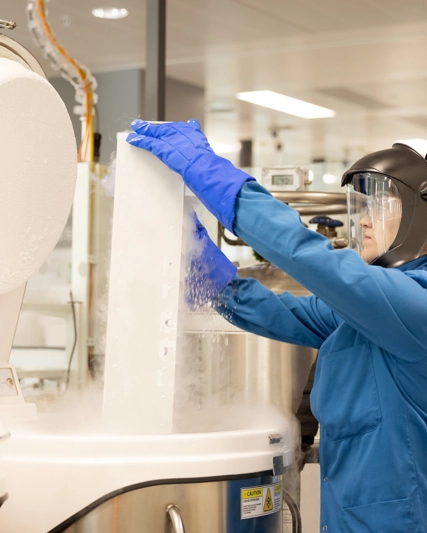Infectious diseases
For over 70 years, GSK has been tackling infectious diseases. Encompassing two-thirds of our pipeline, our extensive infectious disease portfolio includes vaccines, antibiotics, antivirals, and antifungals.

Applying our expertise to tackle infectious diseases
Infectious diseases are responsible for one in six deaths globally. There is a huge need for innovation to tackle chronic infections, seasonal infections, common childhood diseases, rare but devastating conditions such as meningitis, and a range of bacterial infections made more challenging by antimicrobial resistance; as well as diseases which largely impact lower-income countries like malaria and tuberculosis.
We are also committed to addressing neglected tropical diseases (NTDs), which disproportionately affect some of the world's most vulnerable populations. We are providing access to medicines, supporting disease surveillance and control programmes, and advocating for increased awareness and resources to combat NTDs.
Our combined expertise in vaccines and medicines means we can focus on both the prevention and treatment of infectious diseases, resulting in significant public health benefits, reduced deaths and increased productivity.
Respiratory viruses
We’ve been leaders in delivering medicines that help manage respiratory conditions for over 50 years. Respiratory illnesses - such as flu, bronchitis, respiratory syncytial virus (RSV), asthma and COPD - have a significant impact on global health. We are committed to developing treatments that can reduce the burden of respiratory diseases, improve health outcomes, and save lives.
We are also working to prevent these illnesses. We research seasonal viruses that cause diseases like bronchitis which pose a significant risk to older adults and individuals with underlying medical conditions. We are also exploring ways to protect against a broader range of respiratory viruses using advanced vaccine technologies, such as adjuvants and next-generation mRNA.
Anti-infectives research
Acute bacterial infections
Meningitis: One in six people who get bacterial meningitis die and one in five face serious complications. To protect as many children and adolescents as possible, we are working to build a comprehensive understanding of the disease mechanisms to effectively target and treat meningitis. We are deepening our understanding of the different serotypes of the bacteria that cause the disease to help us to develop vaccines that specifically target and combat the strains of bacteria causing meningitis. This may offer broader protection and can lead to more effective prevention and treatment strategies.
Pneumococcal disease is the name for any illness caused by the streptococcus pneumoniae bacterium, such as pneumonia, sepsis or meningitis. Approximately one million children die of pneumococcal disease every year. Vaccines available today only cover about 60% of circulating disease, leaving many vulnerable people at risk of being severely sick or hospitalised with pneumonia, sepsis or meningitis – and even death. Vaccines with broader protection may help to prevent these diseases from the start. We are leveraging MAPS technology to explore how we can provide broader and stronger protection against pneumococcal disease to improve the health and well-being of individuals worldwide.
Chronic hepatitis B (CHB)
CHB is a major global health issue, affecting more than 250 million people across the world. The WHO estimates only 10% of these people have a diagnosis. Almost a million people die each year from hepatitis B and related complications, such as liver cancer.
Our expertise in infectious disease, immunology and human genetics has driven research into CHB for over 35 years. Through our research we have improved understanding of the heterogeneous nature of hepatitis B infections which will help progress towards a comprehensive, functional cure for people living with CHB, a common cause of chronic liver disease. We aim to eliminate the need for continued therapy, ultimately reducing the long-term risk of developing liver complications.



